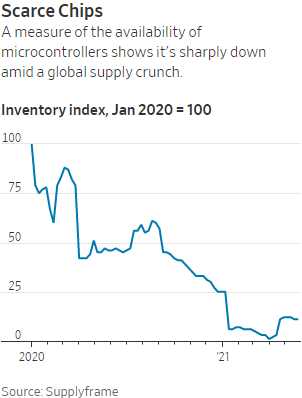Taiwan Semiconductor (TSM)'s stock is up over 4% this morning as they raise the price of chips 10-20%.
TSM is the World's largest chip-maker and inflation is a party for big corporations who stay ahead of the curve and TSM is winning the race now. IPhones use TSM chipe as does pretty much all the advanced electronics we buy so inflation will certainly be kicked up another notch as chips kick off a new wave of price increases which are NOT going to be "transitory."
The price increases have a twofold purpose for TSMC as it addresses the shortage. In the short term, higher prices push down demand and preserve supply for customers who have no other choice. Over the longer term, the higher income will help TSMC invest aggressively in new capacity. That's what Capitalism is supposed to do BUT when the demand they are forced to build for is artificially stimulated – then the price increase is unnecessary and the new factories are a mis-use of funds and the whole thing collapses (recession) when demand goes back to normal after the stimulus is removed.
 That's right – basic economics that everyone seems to have forgotten – ESPECIALLY our policy-makers. WHY is there a chip shortage? People have been forced to stay home, working from home and buying more computers and printers. HPQ has raised PC prices by 8% this year and printer prices are up 20% and contract pricing for computer memory, which is in very short supply, has goune up 34% since the beginning of last year – 34%!
That's right – basic economics that everyone seems to have forgotten – ESPECIALLY our policy-makers. WHY is there a chip shortage? People have been forced to stay home, working from home and buying more computers and printers. HPQ has raised PC prices by 8% this year and printer prices are up 20% and contract pricing for computer memory, which is in very short supply, has goune up 34% since the beginning of last year – 34%!
TSM is going to spend $100Bn over the next 3 years building plants and foundries but what if things are back to normal by them and people are not working at home? Then they will have increased production by 34% for no reason, leaving TSM with 34% excess capacity – and the bill for $100Bn worth of production increases still to pay.
This is how artificial stimulus can cause damage to an economy far into the future,
IN PROGRESS
